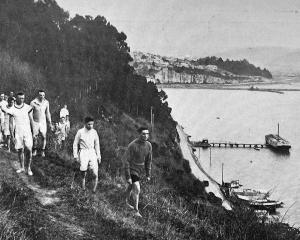He is a brother of Herr Ballin, the great German shipping magnate and head of the Hamburg-Amerika line.
Maximilian Ballin has been in the colonies for many years.
He was apparently an educated man, and was in receipt of remittances from his brother.
He followed a quiet occupation, and kept tradesmen's books, and to all appearances was harmless.
After the outbreak of the war, Ballin's remittance money was apparently stopped, and, being a foreigner, he could not get the class of work he was capable of doing.
Ballin gradually drifted, and some time ago had to go to the hospital.
After his discharge he came back into his old circle in the town, but he could get no work to do.
Eventually, after hanging about for some considerable time, he went to the police station and asked to be arrested.
He was put in the cells and was charged with vagrancy, and justices of the peace sentenced him to three months' imprisonment as the best way of disposing of him.
There is no specially unkind feeling towards Ballin, but as the brother of a personal friend of the Kaiser feeling naturally operates against him at the present time.
It is generally thought that his proper place should be with the interned men.
Apart from his failing powers, his enemy nationality helped to hinder him from making a living.
• One of the men found suffering from smallpox on the arrival of the Willochra here - Private George Wilson, of the Otago Battalion of the Second Reinforcements - died on Quarantine Island shortly before noon yesterday.
Deceased was formerly a miner at Kaitangata.
His condition had been so serious during the last few days that the end was not unexpected.
He was buried on the island with military honours yesterday afternoon.
The other two smallpox patients are doing well, and the cot cases also are making good progress.
All the difficulties that threatened at one time to hinder the prompt refitting of the Willochra have been swept away, and a large body of men was carrying on the work apace yesterday.
The vessel is to be thoroughly painted and cleaned inside from stem to stern.
It will not be necessary for her to go into dock this time, as she was docked on her last voyage, only three months ago.
• The Hon. Dr R. McNab, Minister of Marine, on his return from the South Island, told a Wellington Post reporter that during his trip he visited the fish hatchery at Hakataramea, and while there saw those in charge trapping salmon as they came up the river, and stripping them.
Up to the time he was there, about 506,000 ova had been stripped, 17,000 were stripped the day he was there, and 75,000 the next day.
"We expect, with the second station on the Dobson,'' said Dr McNab, "that we will strip nearly a million ova this year. The fry will be placed in the Hokitika River, as the evidence shows that all the East Coast rivers are being filled with salmon from the Waitaki, and if we can fill the Hokitika River we expect it to fill all the others to the north of it. From the number of fish that are running up the river they must be there in hundreds of thousands. Up to the time of my visit 310 had been caught in the Hakataramea, which is a small tributary, and another year or two should enable us to open up some of the rivers for salmon fishing.''
Dr McNab added that he had heard of the fish being caught at sea as far south as Foveaux Strait and right up to the Hurunui. - ODT, 23.5.1916.
• COPIES OF PICTURE AVAILABLE FROM ODT FRONT OFFICE, LOWER STUART ST, OR WWW.OTAGOIMAGES.CO.NZ











